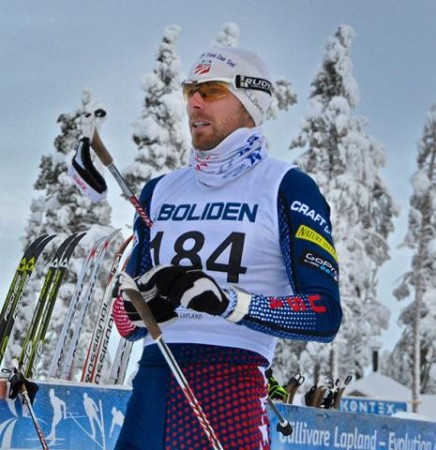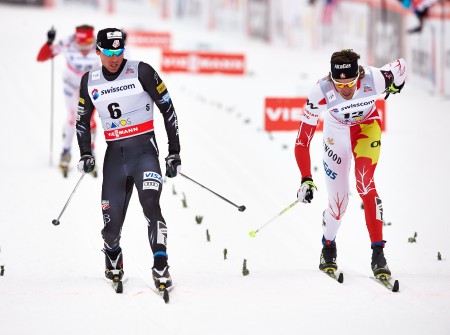
Amidst some heavy hitters from Canada and Russia, U.S. Ski Team veteran Andy Newell proved he packed some punch during the men’s 1.4-kilometer classic sprint on Saturday in Gällivare, Sweden.
“I felt good all day long, really,” said Newell in a post-race phone interview. “That’s kind of the main goal going into these races, is not so much the result, but getting a good response from your body.”
On Saturday, his body told him to go for it.
After finishing second in the qualifier, 2.87 seconds behind 23 year-old Russian Sergey Ustiugov, Newell, 31, explained his instincts only got better.
“I went into my quarterfinal heat and I knew I had [Canadian] Alex [Harvey] in there, who is a tough sprinter, so I tried to control the heat and put down a move up the last hill,” he said.
By controlling the heat early on, Newell won his quarterfinal and advanced with Harvey, who finished just 0.14 seconds later.
“None of us wanted to lead [the quarterfinal],” Harvey explained in a phone interview. “So Andy went in front.”

Along with Harvey, two other Canadians finished second in their quarterfinals: Devon Kershaw and Lenny Valjas. Kershaw was just 0.83 seconds behind his heat’s winner Ustiugov. Valjas edged Poland’s Konrad Motor in a photo finish for second in his quarter final and Russia’s Evgeniy Belov crossed the line in first.
Rounding out the North American crew that moved on to the semifinals was 24-year-old Erik Bjornsen, who finished second in his quarterfinal, just one-tenth of a second back from Russia’s Stanislav Volzhentsev.
“Today’s race was a good chance to blow out some steam and get the body ready for the World Cup,” Bjornsen wrote in an email. “I’ve been feeling a little tired from the training year, so it was good to finally have some snap and spark to the movements.”
In a North American showdown, Newell, Harvey, Valjas, and Bjornsen all advanced to the same semi-final. Bjornsen finished fourth, two seconds behind Newell in second and Harvey in third. Valjas finished four seconds later in fifth. While Harvey, Bjornsen and Valjas did not advance (ultimately placing seventh, eighth and 10th overall) and Kershaw was fifth in the other semifinal (for ninth overall), Newell moved on to the final.
“I think the challenge of [sprinting] is knowing how to respond to different tactics out there and knowing when to use your strengths and also recognizing what your weaknesses might be,” Newell said. “Between the Russians and Canadians, it was a pretty tough field with a lot of good sprinters. In order to make the final, I actually came into the lanes in third and [had] to sprint past Harvey and [Russia’s Evgeniy] Belov.”
While Belov beat Newell by 0.17 seconds for the semifinal win, Newell edged Harvey for second in a photo finish by 0.18 seconds.
The lone North American in the final, Newell knew where he wanted to set his sights.
“Anytime I get on the start line in a sprint I want to try and win the race” he said. “In the final I knew I just had to hang on to Ustiugov, because he had been trying to go off the front all day.”
With tenacity, Newell entered his fourth hard effort of the day and posted his fastest course time, just 1.43 behind Ustiugov’s winning pace of 2:45.95.
“[Ustiugov and I] were able to pull away from most of the field and I stuck with him up the last hill,” Newell said. “[When] we came into the lanes, I was right behind him and I thought for a second I might be able to get around him, but he just had too much speed in the last hundred meters.”
Ustiugov managed to gap Newell by 1.63 seconds for the win. Belov placed third, 2.63 seconds back. Rounding out the sprint final were Poland’s Maciej Staręga in fourth (+4.96), Volzhentsev in fifth (+6.36), and Sweden’s Johan Haeggström in sixth (+13.07).
“Newell has been skiing exceptionally well all year at camps, better than I’ve ever seen him and he proved today that that was no illusion, he was stronger and stronger every heat,” said U.S. Ski Team coach Matt Whitcomb. “He looked absolutely fantastic in the last part of his final round today, so that was really exciting.”
Despite not having any skiers in the final, Canadian head coach Justin Wadsworth feels his athletes are ready for the World Cup.

“Right now, I think everyone is ready to start the [World Cup] mini-tour next week in Finland,” he said during a phone interview. “Everyone is in a good place, we’ve just got to tune up the engines a little bit more, but that’s kind of normal for our team at the start of the year so I’m not too concerned.”
“It was the first race on snow since last March, so just getting the bib on, getting the routine on again … is important,” Harvey explained.
Keeping the Kuusamo World Cup next weekend and the rest of the season beyond that in mind, Newell said he thought the Gällivare sprint races benefitted his team.
“I think we’re already looking better than we did last year because we were able to get this practice race in and I think we’re going to be feeling a lot better next weekend than we did last year,” he said.
With the proper preparation and practice, Newell is personally feeling more ready than ever for the upcoming season. “What a good sprint racer can do is make decisions while they’re out there racing and kind of react to certain attacks or make the attacks themselves,” he said. “I think what you’ll see more from me more this year is I’ll be the one making attacks and not responding to other peoples’.”
Racing in Gällivare continues Sunday with the 10/15 k freestyle.
Gabby Naranja
Gabby Naranja considers herself a true Mainer, having grown up in the northern most part of the state playing hockey and roofing houses with her five brothers. She graduated from Bates College where she ran cross-country, track, and nordic skied. She spent this past winter in Europe and is currently in Montana enjoying all that the U.S. northwest has to offer.



